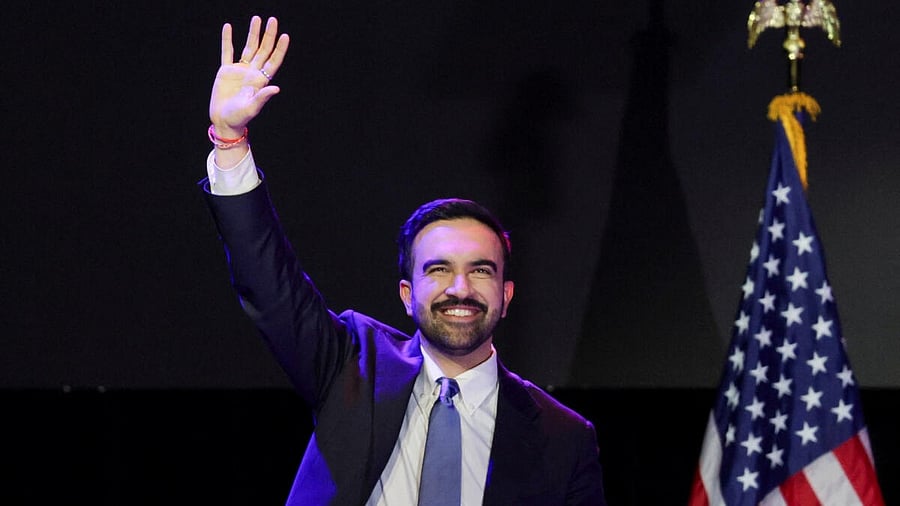
Zohran Mamdani reacts after winning the 2025 New York City Mayoral race
Credit: Reuters Photo
New York: On Tuesday night, not a seat was empty at Moka & Co., a coffee shop nestled among the halal takeout restaurants and Yemeni cafes that line the streets of Astoria, Queens.
Hundreds of people had crowded into the shop an hour before polls closed for an Election Night watch party hosted by the Muslim Democratic Club of New York and several other Muslim and South Asian groups.
As the first results in the New York City mayor’s race began to appear on three large televisions, those in the crowd chatted excitedly in English, Bangla and Arabic. What once seemed impossible now appeared almost certain: New York’s hundreds of thousands of Muslim residents would live in a city led by its first-ever Muslim mayor.
When the race was officially called for Zohran Mamdani just after 9:30 p.m., chants of “Mamdani!” rang out. Cellphone flashlights lit up the cafe as the excited throng sought to record history. The atmosphere was electric.
“Alhamdulillah,” one young man said to a friend, using the Arabic phrase giving thanks to God.
“It’s surreal,” said Fatima Khan, 32, adding that she was in awe to be in the presence of so many Muslim leaders at a single cafe. “He won!” she shouted, barely able to contain her enthusiasm.
When Mamdani is sworn in as mayor on Jan. 1, he will become the most prominent Muslim elected official in the United States. His victory is also an inflection point for New York’s Muslims, who have often felt excluded from many aspects of the city’s public life.
With Mamdani’s election, as with his campaign, his fellow Muslims have not only become a vital part of the city’s political infrastructure — they can see one of their own at the top of it.
“I voted early, and I cried,” said Sumaiya Chowdhury, a 41-year-old pharmacist who lives in Bayside, Queens. Before the election, she said, she would not have imagined that a Muslim could be elected mayor of New York.
As of late Tuesday, Mamdani had racked up about 1 million votes, roughly half of the more than 2 million tallied — the highest total for a New York City mayor’s race in more than five decades.
The high cost of living in New York City — or, in Mamdani’s one-word formulation, affordability — was his indelible campaign message. It attracted hordes of working-class voters, many of whom were casting ballots for the first time. Working-class Muslims were among those drawn by the message.
“It feels good that he is Muslim, but it’s not important,” said Tarek Mnawer, 46, who voted for Mamdani in the Bronx on Tuesday. “It’s about what it can do for the community, the people.” He added: “New York is an expensive place, but if you make it affordable, then that is good for everybody.”
Known for its social-media savvy, Mamdani’s campaign also engaged in old-fashioned retail politics, sending thousands of volunteers to knock on doors in heavily Muslim areas of Queens like Ozone Park and Jamaica; Brooklyn’s Kensington neighborhood; and the Parkchester section of the Bronx. The campaign reached voters in Arabic, Bangla and Urdu. Many Muslim and South Asian voters became his earliest and most ardent supporters.
In weaving his faith into his campaign, he prayed with fellow Muslims in visits to more than 50 mosques. He also generated one of the campaign’s first viral moments and touched off a pseudo-controversy on social media by posting a photo that showed him eating a burrito on the Q train to break his Ramadan fast.
Many voters noted how deftly Mamdani addressed the episode. Muslim New Yorkers also saw a candidate who was comfortable talking about breaking the Ramadan fast. It was a nod to the everyday faith and culture of the city’s Muslims, who had rarely felt so seen.
“Muslims are literally everywhere in the city,” Rana Abdelhamid, the founder of a Queens nonprofit, said. “Educators, business owners from bodegas. Walk down the street, you’re going to get halal food. We’ve been the backbone of so many parts of the city for so long, and now this is our time.”
Since the Sept. 11 attacks, Muslim New Yorkers have often had to contend with blatant Islamophobia. Mamdani’s rise reignited that sentiment. In the closing weeks of the campaign, attacks on his faith pushed him to veer from his core economic message.
Standing in front of the Islamic Cultural Center of the Bronx in late October, he delivered a 10-minute address describing his faith, his identity and the tendency among Muslims, including himself, to live “in the shadows” of the city. He vowed not to hide his faith.
“We talk about New York being this melting pot, being this place that everyone can feel like they belong in,” said Asad Dandia, a public historian and tour guide who sued the Police Department successfully in 2013 after it spied on his mosque and community. “And sometimes it feels like we’re speaking in theoretical terms. Part of me felt that New York just was not ready for a Muslim mayor.
“But it turns out we have one right now,” he added.
Several Muslim community leaders and organizers said they expected an increase in political engagement among Muslims and South Asians across the city as a result of Mamdani’s political ascent. In recent months, two Bangladeshi candidates have announced plans to run for office in Queens, including Mary Jobaida, who is seeking Mamdani’s state Assembly seat in Astoria.
For Muslims like Aminata Diallo, a 28-year-old student who moved to the Bronx from Mali, Mamdani’s victory on Tuesday was the first time she felt that a political leader represented and understood her.
“Zohran’s story is so many of our own stories,” she said, later adding, “He’s showing that we belong in every space — that our voices and values have a place in shaping the city’s future.”